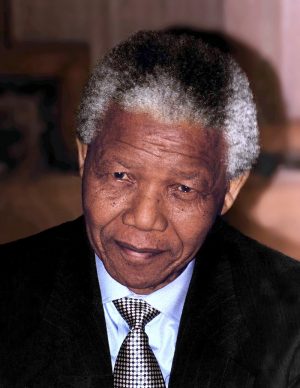Nelson Mandela is one of the most iconic and influential figures in history. A tireless advocate for human rights, he dedicated his life to fighting for the equality of all people in Africa. Despite spending 27 years in prison, Mandela never lost sight of his goals and emerged as a leader in the struggle against apartheid. His work has had a profound impact on millions of people around the world, and he remains an inspiration to everyone who believes in the ideal of human equality.
Family Background
Nelson Rolihlahla Mandela was born on July 18, 1918, in the village of Mvezo, in South Africa’s Eastern Cape Province. His father, Nkosi Mphakanyiswa Gadla Henry, was the chief of the Tembu Tribe. Gadla Henry had four wives and fathered 13 children. His mother, Nonqaphi Fanny Nosekeni, was Gadla Henry’s third wife and a member of the Xhosa tribe.
As was customary among the Xhosa, Nelson was given a traditional South African name at birth, Rolihlahla, which meant “pulling the branch of a tree” or colloquially as “troublemaker.” When he was seven years old, he was sent to a local Methodist school where his teacher, Miss Mdingane, gave him the English name Nelson on the first day.
Nelson’s father died when he was nine, so he was subsequently sent by his mother to Chief Jongintaba Dalindyebo, his father’s cousin. Jongintaba was the regent of the Thembu people. He had a son named Justice and a daughter named Nomafu. Jongintaba and his wife, Noengland, raised Nelson as if he were their own son.
Political Career
Nelson studied law at the University of the Witwatersrand in Johannesburg, where he experienced racism. He was the only black African student at the university. It was there that he met Joe Slovo and Heloise Ruth First, who both held communist ideologies.
He joined the African National Congress (ANC) and actively participated in the anti-apartheid movement. He co-founded the ANC Youth League in 1944 with fellow activists Oliver Tambo, Anton Lembede, A.P. Mda, and Jordan Ngubane. Together, they worked to increase membership in the ANC and build support for the organization’s goals. In 1948, the National Party came to power in South Africa and began implementing its policy of apartheid, which institutionalized racial segregation and discrimination against black South Africans.
In 1961, Mandela co-founded Umkhonto we Sizwe (translated to English as “Spear of the Nation”) with Walter Sisulu and Joe Slovo. Abbreviated as MK, the organization was initially a separate militant group inspired by the military theorist Carl von Clausewitz and the guerilla warfare tactics of Mao Zedong, Che Guevara, and Fidel Castro. The goal of the organization was to use violent guerrilla tactics to fight against the South African government’s unjust policies, so Nelson did not want it associated with the ANC.
During the Rivonia Trial, Nelson gave his “I am Prepared to Die” speech. It lasted for three hours and gained international attention. There were global calls for his release, but on June 12, 1964, Nelson was proclaimed guilty of all charges. The prosecution called for a death sentence, but justice De Wet sentenced him to life imprisonment instead.
While in prison, Nelson was verbally abused and physically harassed by several white prison wardens. The political prisoners were held in conditions designed to break their spirits and make them give up. Instead, they banded together and organized work and hunger strikes to improve prison conditions.
After his release from prison in 1990, Nelson gave a speech at Cape Town’s City Hall. He declared his commitment to peace and reconciliation with the white minority but promised to continue the ANC’s armed struggle as a “purely defensive reaction” against apartheid’s brutality. He said that he hopes the government would agree to negotiations so that there would not be a need for more violence.
Nelson Mandela continued his work with the ANC to fight for the end of apartheid and the equality of all people in South Africa. On April 27, 1994, he was elected the first black president of South Africa. Two years later, a new Constitution of South Africa was drafted and approved by Parliament.
During his presidency, Nelson worked to improve the living conditions of black South Africans and reconcile the country’s divisions. He also established the Truth and Reconciliation Commission to investigate human rights abuses. After serving one five-year term, he retired from politics in 1999.
Nelson Mandela is globally regarded as a symbol of democracy and social justice. He was praised by the United Nations and given more than 250 accolades, including the Nobel Peace Prize. In South Africa, he is often referred to as the “Father of the Nation.”
Personal Life
While he was in the public eye for most of his political career, Nelson Mandela wanted to live a quiet life with his family after retirement.
He was married three times and had six children in total. His first wife, Evelyn Mase, was a nurse whom he married in 1944. The couple had four children together: Madiba Thembekile Makaziwe, Makgatho Lewanika, and Pumla Makaziwe. Evelyn and Nelson divorced in 1957.
His second wife, Winnie Madikizela-Mandela, was an activist. The couple married in 1958 and had two daughters together: Zenani and Zindzi. The marriage ended in divorce in 1996 due to Winnie’s infidelity and Nelson’s political career.
His third wife, Graca Machel, was the widow of Mozambican president Samora Machel. The couple married in 1998 but had no children together.
Nelson Mandela died on December 5, 2013, at the age of 95, after a long battle with a lung infection. He is survived by his wife, Graça Machel, as well as his children and grandchildren.
